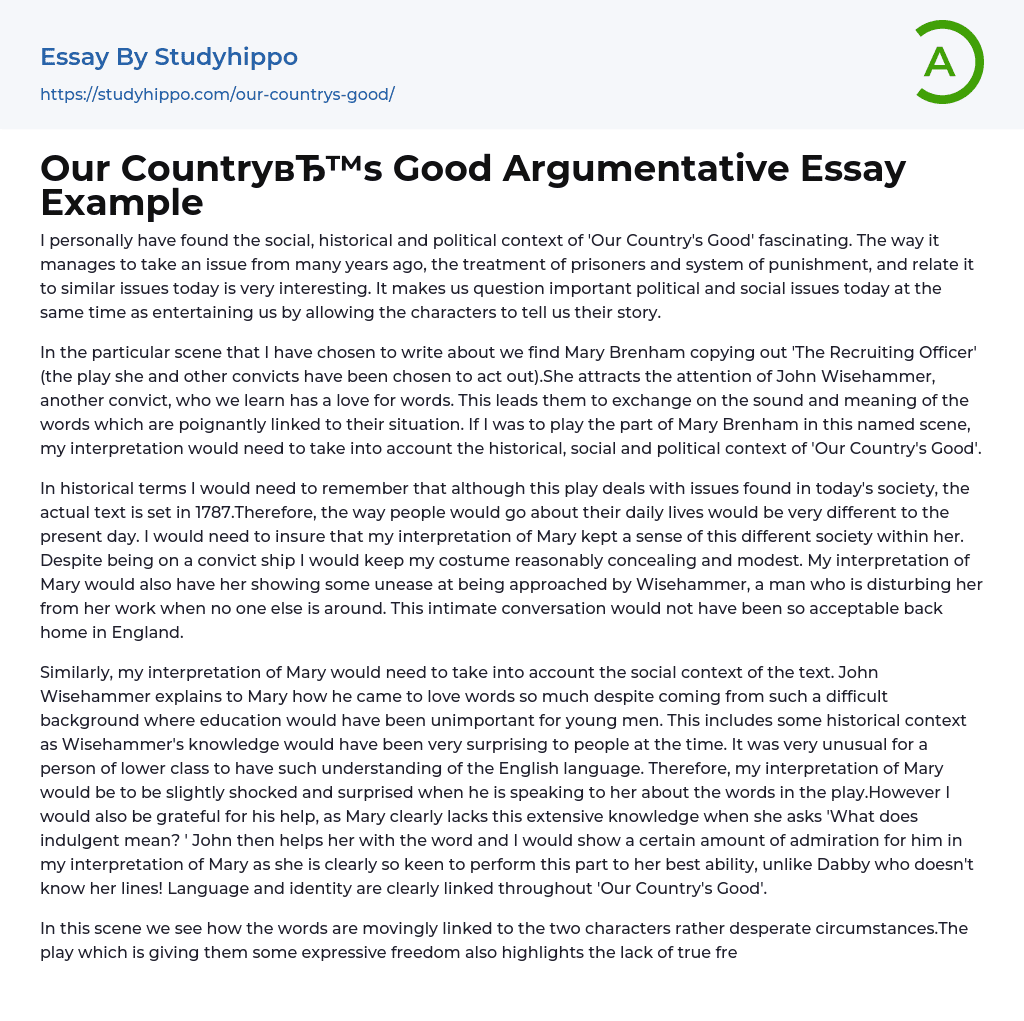The social, historical, and political context of 'Our Country's Good' has captivated me. Its ability to connect the treatment of prisoners and punishment systems from the past to current issues provokes thought and interest. This play effectively raises important political and social questions while also entertaining its audience through the characters' personal narratives.
The selected scene portrays Mary Brenham transcribing 'The Recruiting Officer,' the assigned play for herself and fellow convicts to perform. John Wisehammer, another convict, becomes interested in her work, revealing his passion for language. This sparks a discourse between them regarding the significance and resonance of certain words, particularly in relation to their circumstances. To accurately portray Mary Brenham in this scene, it would be necessary to consider the historical, social, and political background of 'Our Country's
...Good'.
Although dealing with contemporary issues, it is important to keep in mind that the text of this play is set in 1787. Thus, everyday life is significantly different from today. Maintaining a sense of this society is crucial to portraying Mary accurately. Even on a convict ship, her costume should be modest and concealing. Additionally, it's important to convey Mary's unease at being approached by Wisehammer, especially since an intimate conversation like this would not be acceptable back in England.
The social context of the text must be taken into account when interpreting Mary's character in "Our Country's Good". John Wisehammer's love for words, despite his difficult background, surprises Mary, given the historical context of the play where it was uncommon for a person of lower class to have a deep understanding of English language. Thus, Mary displays a mixture of shock and gratitude when John
helps her understand a word she is unfamiliar with, showcasing her ambition to perform well in contrast to Dabby's lack of preparation. The intertwined themes of language and identity are prevalent throughout the play.
The scene creatively connects the characters' hopeless situations with their words. The play allows for some expressive liberty, but also emphasizes the lack of genuine freedom in their lives. To convey the deeper meaning within their dialogue, I must emphasize certain lines, such as Mary's "Love is a good word." This line is significant because it echoes her earlier statement, "I don't know why I did it. Love, I suppose." In a Brechtian fashion, I would directly address the audience, challenging them and disrupting the symmetry of the characters' conversation. This scene's beauty lies in its powerful political message that counters Governor Phillip's previous remark that speaking Farquhar's language would refine the convicts' language and allow them to express delicate sentiments they are not accustomed to.
Despite the statement made, scene 10 completely contradicts it. A political message that criminals are humans and even capable of expressing refined sentiments through language can be conveyed by analyzing Mary's character and her past in relation to these lines and words.
- Age Of Enlightenment essays
- Ethos essays
- Time essays
- Acceptance essays
- Meaning Of Life essays
- Reality essays
- Natural Law essays
- Political Philosophy essays
- Utilitarianism essays
- Existence essays
- Free Will essays
- Good And Evil essays
- Confucianism essays
- Relativism essays
- Conscience essays
- Environmentalism essays
- Empiricism essays
- Epistemology essays
- Ethics essays
- Existentialism essays
- Human Nature essays
- Individualism essays
- Metaphysics essays
- Philosophy Of Life essays
- Transcendentalism essays
- Truth essays
- Destiny essays
- Determinism essays
- Fate essays
- Functionalism essays
- Philosophers essays
- Pragmatism essays
- Future essays
- Child Observation essays
- Critical Reflection essays
- Teaching Philosophy essays
- Personal Philosophy essays
- Action Speak Louder Than Words essays
- Can Money Buy Happiness essays
- Values of Life essays
- Ethical dilemma essays
- Normative Ethics essays
- Virtue Ethics essays
- Belief essays
- Deontology essays
- Moral essays
- Virtue essays
- Work Ethic essays
- Henry David Thoreau essays
- Carl Jung essays




